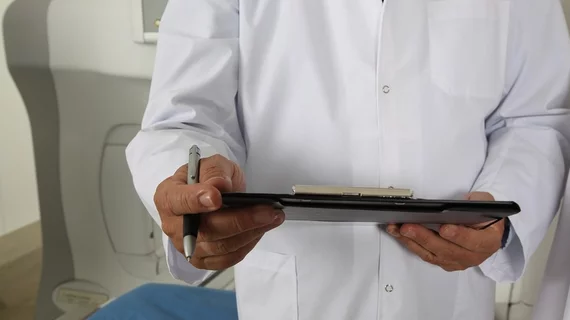Smartphone app reduces incorrectly ordered imaging exams, boosts interprofessional education
Many healthcare organizations struggle with appropriate utilization and ordering of imaging examinations. However, researchers from Vanderbilt University Medical Center in Nashville, Tennessee have found that a smartphone app may serve as an effective and valuable workplace-based education tool to help decrease the amount of incorrectly ordered scans, according to research published Jan. 2 in the Journal of the American College of Radiology.
Incorrectly ordered examinations can put patients at risk for high radiation exposure, among other issues, and consequently may not accurately assess the clinical question of the ordering provider, explained Lori A. Deitte, MD and colleagues. Although challenging, incorporating interdisciplinary and interprofessional learning amid busy clinical practice may help.
“It has been proposed that workplace-based learning will be essential to health care education in the future, allowing participants to acquire knowledge on their own time and in an efficient manner conducive to busy clinical schedules,” Deitte et al. wrote.
Using asynchronous “spaced education”—daily or weekly testing with questions via a web-based smartphone app—on ordering outpatient CT scans, the researchers found that the number of appropriately and accurately ordered scans increased by more than 10 percent in a single department.
Three months before and throughout the study, all outpatient CT exams ordered by the Vanderbilt Medical Center’s Department of Urology were reviewed and categorized as either appropriately ordered or flagged for re-protocoling. Patient clinical history and electronic medical records were incorporated into the final review by several radiologists and the respected ordering provider.
A total of 104 out of 303 ordered CT examinations were re-protocoled. Incorrect orders mostly related to contrast orders, including scans for metastatic prostate or testicular carcinoma and renal cell carcinoma recurrence post-ablation, according to the researchers.
From the data, 36 case-based multiple-choice questions were developed by a fellowship-trained abdominal imaging radiologist and edited by two abdominal imaging radiologists and a urologist.
A total of 28 urologists and non-physician providers from the university’s department of urology voluntarily participated in the automated system for receiving the daily case-based questions via email or text through the app. The 36 multiple-choice questions were delivered Monday through Thursday over a three-month period (excluding holidays) and responses remained anonymous.
Participants received feedback immediately answering a question. The feedback included a detailed explanation of the correct answer and of each incorrect option, while also referring and linking to the ACR Appropriateness Criteria. Each question expired after 24 hours, and if not answered feedback was still provided. Of the 28 participants, 20 engaged in the app.
Overall, the amount of CT examinations ordered requiring re-protocoling by a radiology attending physician decreased from 34.3 percent at three months before the beginning of the study to 19.9 percent at six months post-study, according to the researchers.
“This method of education is valuable and can be incorporated into clinical training, continuing medical education, and quality improvement projects,” the researchers concluded.

